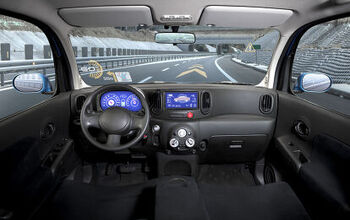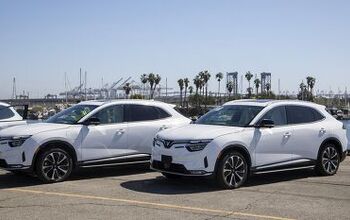Insurance Companies Are Keeping Tabs on How Often You Use Your Phone Behind the Wheel

With mobile phones now a ubiquitous part of modern-day life, distracted driving has ballooned into a legitimate public safety problem. Alarming studies continue to pour in, with many claiming that driver cell phone use is likely underreported by authorities in crash reports. It’s hard to quantify, especially since nobody wants to admit that their moment of weakness may have contributed to an accident.
Add in a National Highway Traffic Safety Administration survey that found 30 percent of drivers aged 21 to 34 believe texting doesn’t negatively impact their driving, and you’d be forgiven for picking up your keys with sweaty palms.
A new study claims the issue has only gotten worse, with drivers spending more time on their phone than ever before. However, the way the data was acquired is disconcerting in itself. Insurance companies are tapping traffic data startups to monitor people’s phones, and they’re already capable of tracking millions of American devices.
One of these companies is called Zendrive.
It’s marketed to consumers as a way to monitor and optimize their personal driving behaviors whilst simultaneously providing fleet-based services with analytics. However, the company also provides data to insurance companies and could help open a Pandora’s box of new charges and fees based on phone usage in vehicles. On the one hand, we’re totally against distracted driving and making it less palatable is probably the way to go. On the other, while we know that the selling of marketable information is big business these days, the amount of data companies like Zendrive collect and share with insurers shouldn’t leave anyone feeling comfortable.
Bloomberg reports that the company recently crossed usage data from the tens of millions of cellphones it monitors with a self-assessment to the same drivers. The verdict? People continue to vastly overestimate how competent they are behind the wheel, and overall phone usage is up for 2019. Zendrive said the worst distracted driving offenders were among the most likely to give themselves high marks for paying attention and estimated that around 80 percent of drivers will pick up their phone at least once by 4 p.m.
Numerous insurance companies already offer discounts to those practicing cell phone restraint (like Esurance’s DriveSense), but the glut of data also encouraged them to raise rates on those who don’t (or simply refuse to agree to have their cell phones monitored).
From Bloomberg:
Zendrive now has its monitoring technology on 60 million phones, roughly one of every four U.S. drivers. TrueMotion, a rival, is tracking distraction and other driving metrics for eight of the top 20 U.S. auto insurers, and an additional 30,000 drivers have voluntarily downloaded the TrueMotion system in attempt to self-regulate tendencies to talk and text at the wheel.
A third provider, Cambridge Mobile Telematics, monitors distracted driving for 35 insurers, including State Farm. In addition to siphoning smartphone data, Cambridge Mobile uses a Fig Newton-sized puck that provides even better metrics on vehicle performance and phone use. This quarter, the company shipped 8 million of the devices.
TrueMotion’s marketing director, Matt Fiorentino, claims distracted driving is more predictive of an eventual loss claim than pretty much any other trackable behavior — including speeding.
Fiorentino said individuals who frequently use their phone behind the wheel see roughly 20 percent more claims than other drivers. “This is creating a pretty clear picture,” he said, adding that the margins of underwriters who best identify inattentive drivers will improve, while less-responsible customers will be pushed onto other companies. Ultimately, it sounds as though pretty much every insurer will soon wish to keep tabs on your phone.
Obviously, this raises all kinds of privacy concerns, which puts it in line with almost every new technology in the automotive or tech industry these days. As connected cars become the new status quo, insurers will be equally likely to reach out to automakers for data vs requesting you install an app on your phone that tracks how often you’re using it. Just knowing someone is watching is supposed to help curb unwanted behavior.
Cambridge Mobile’s vice president of marketing, Ryan McMahon, said distraction levels dropped by 35 percent among participants who checked their data regularly. “Just seeing the results helps,” he said. “It’s almost like going into a restaurant and being able to see calories on a menu.”
Of course, that restaurant doesn’t then go out of its way to tell every healthcare provider how you plow through a case of donuts every Saturday. But it’s a solid analogy, otherwise.
ConnectedTravel, which previously collaborated with Honda on DreamDrive, claimed a 40 percent reduction in overall phone use in four out of five drivers who check their driving metrics daily. “We just provide you with stats, just like fantasy sports or anything else,” CEO Bryan Biniak said. “Nobody believes you can change peoples’ behaviors — that’s a common view in the industry … but when you start to create awareness, it’s impactful.”
Promoting good driving behaviors and awareness is supremely important; we’d just rather see it done through clever public service announcements. Someone coming on the radio to remind you that distracted driving is stupid, for example, or taking a minute to explain who has the right of way at a four-way stop would be far less invasive than a company perpetually tracking your mobile device. However, we can’t say with any certainty that it would be more effective. It seems that’s what insurance companies are banking on.
[Image: Dusan Petkovic/Shutterstock]

A staunch consumer advocate tracking industry trends and regulation. Before joining TTAC, Matt spent a decade working for marketing and research firms based in NYC. Clients included several of the world’s largest automakers, global tire brands, and aftermarket part suppliers. Dissatisfied with the corporate world and resentful of having to wear suits everyday, he pivoted to writing about cars. Since then, that man has become an ardent supporter of the right-to-repair movement, been interviewed on the auto industry by national radio broadcasts, driven more rental cars than anyone ever should, participated in amateur rallying events, and received the requisite minimum training as sanctioned by the SCCA. Handy with a wrench, Matt grew up surrounded by Detroit auto workers and managed to get a pizza delivery job before he was legally eligible. He later found himself driving box trucks through Manhattan, guaranteeing future sympathy for actual truckers. He continues to conduct research pertaining to the automotive sector as an independent contractor and has since moved back to his native Michigan, closer to where the cars are born. A contrarian, Matt claims to prefer understeer — stating that front and all-wheel drive vehicles cater best to his driving style.
More by Matt Posky
Latest Car Reviews
Read moreLatest Product Reviews
Read moreRecent Comments
- SCE to AUX "...to help bolster job growth and the local economy"An easy win for the politicians - the details won't matter.
- Kjhkjlhkjhkljh kljhjkhjklhkjh so now we will PAY them your tax money to build crappy cars in the states ..
- SCE to AUX Yes, I'll miss it, and it doesn't make sense to kill off your 3rd-best seller. 2023 was its best year since 2018.
- SCE to AUX This was the same car I had (05 xB, stick, "camouflage" color) for 7 years - great car.We called ours "The Lunchbox". I added aftermarket wheels, and the 3rd-party cruise control the dealers could install.It suffered only two failures: bad window switch in week 2 (dealer fixed in 1 hour), bad trailing O2 sensor (fixed myself for $70). Fuel economy was always 28-34 mpg.It was a potential death trap, and ride quality became unbearable after 2 hours. I once did a 10-hour round trip in it and could barely walk after.Traded it for a 2012 Leaf, which was a better car in some ways.
- Bd2 The "e" nomenclature signifies the e-ATPs which BMW is pursuing.


































Comments
Join the conversation
My biggest question, aside from the obvious privacy concern, is this: how, exactly, do these companies define "being on your phone"? Is it phone calls, and if so, can they tell the difference between a call that's hands-free (which isn't much of a distraction) and one that's not? Does "texting" include being able to see your texts on your infotainment screen and pick a canned response like "OK" (which I can do with my car, and, again, isn't much of a distraction)? Does "being on apps" include things like streaming music, and what about Android Auto or Apple Car Play, which (assuming you plug your phone in when you get in the car) are "on" during your entire drive? How sophisticated is this monitoring? If it's sophisticated enough to deduce the "truth" from situations above, then why would I be OK with that level of intrusion to begin with? This is the problem with privacy, folks - it's not that insurance companies don't have a vested interest in safety, which dovetails with our vested interests, but rather that this feels like a really good way to "gotcha" people who really don't pose a distracted-driving risk into paying more.
I have seen how poorly some of those 21-34 year olds drive and texting may not impact them as much as a more "seasoned" driver. A lot of them see a car as any other appliance and if you crash one, you just get another.